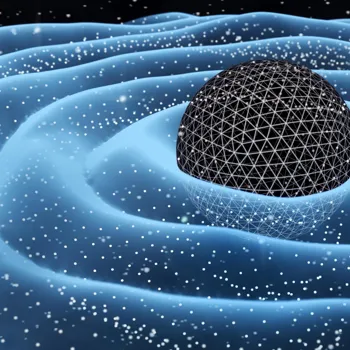Dive into the world of Theoretical Physics: Exploring India's quest to unravel the universe's mysteries. Discover more here!
For centuries, Indians have gazed at the stars, pondering the mysteries of the cosmos.
From the ancient Vedic texts describing the structure of the universe to the modern-day achievements of ISRO, India has a rich tradition of astronomical inquiry.
However, exploring the vastness of space requires more than just telescopes and spacecraft. It needs the power of the human mind, specifically, the tools and concepts developed within theoretical physics. Theoretical physics, at its core, is about building mathematical models of the universe.
It's about taking observations and experimental data and crafting theories that explain why things are the way they are. These theories, often expressed in complex equations and abstract concepts, allow scientists to make predictions about phenomena that haven't even been observed yet.
This predictive power is crucial for advancing our understanding of the cosmos.
Indian physicists unravel universe mysteries, impact tech and space
Theoretical physicists in India are playing a crucial role in unraveling some of the biggest mysteries of the universe. They are working on diverse topics, from understanding the nature of dark matter and dark energy to exploring the physics of black holes and the early universe.

These theoretical endeavors are not merely academic exercises; they have the potential to revolutionize our understanding of the fundamental laws of nature and to drive technological innovation.
The future of space exploration rests heavily on the shoulders of these thinkers and their ability to create and refine the theories that guide our journey into the unknown.
Exploring dark matter and dark energy in theoretical physics
One of the most intriguing areas of research in theoretical physics is the study of dark matter and dark energy. These mysterious entities make up about 95% of the universe, yet we know very little about them.

Dark matter, as the name suggests, doesn't interact with light, making it invisible to telescopes. Its presence is inferred from its gravitational effects on visible matter, such as galaxies.
Dark energy, on the other hand, is thought to be responsible for the accelerating expansion of the universe.
Indian theoretical physicists are developing new models to explain the nature of these dark entities, exploring possibilities such as weakly interacting massive particles (WIMPs) and modified theories of gravity.
These investigations require a combination of theoretical calculations, computer simulations, and experimental data from telescopes and particle accelerators.
Black holes, real objects with intense gravity, challenge understanding of quantum mechanics
Black holes, once considered purely theoretical objects, are now known to be real, thanks to observations of their gravitational effects and, more recently, direct imaging. These objects are regions of spacetime where gravity is so strong that nothing, not even light, can escape.

Theoretical physicists are studying the properties of black holes, including their event horizons (the boundary beyond which escape is impossible) and their singularities (the points of infinite density at their centers).
They are also investigating the connection between black holes and quantum mechanics, a realm of physics that governs the behavior of matter at the atomic and subatomic levels.
This connection is particularly important for understanding the fate of information that falls into a black hole, a problem known as the information paradox.
The early universe's extreme conditions and expansion post-Big Bang
The early universe, a period of rapid expansion and extreme conditions shortly after the Big Bang, is another area of intense research in theoretical physics.
During this period, the universe was much hotter and denser than it is today, and the laws of physics that govern its behavior were likely different.
Theoretical physicists are developing models of the early universe that incorporate concepts from general relativity, quantum mechanics, and particle physics. These models aim to explain the origin of the universe's structure, the formation of galaxies, and the abundance of different elements.
Indian scientists are contributing to this field by studying the cosmic microwave background radiation, a relic of the early universe that provides valuable information about its conditions.
The importance of theoretical physics in shaping India's future
The work of theoretical physicists might seem abstract and far removed from everyday life, but it has the potential to transform our understanding of the universe. It refines our knowledge and helps to create new technologies.
For India, investing in theoretical physics is not just about pursuing fundamental knowledge; it's about investing in the future. By supporting research in this field, India can become a global leader in space exploration and technological innovation.
The insights gained from theoretical physics can lead to new materials, new energy sources, and new ways of communication. By encouraging young minds to explore the mysteries of the cosmos, India can unlock a future filled with scientific breakthroughs and technological marvels.
This includes investment in educational programs and facilities.
AI Generated Content. Glance/InMobi shall have no liability for the content




















